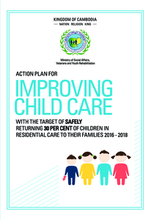EXECUTIVE SUMMARY
The Royal Government of Cambodia (RGC) has set a strong resolve in this Action Plan to Prevent and Respond to Violence Against Children 2017-2021 (Action Plan) to join the global movement to end violence against children, as articulated in the Sustainable Development Goals (SDG) and the 2015 ASEAN Regional Plan of Action on the Elimination of Violence Against Children. Findings from the Cambodia Violence Against Children Survey in 2013 showed that many of Cambodia’s children experience physical, emotional, and sexual violence. Multiple sources also delineate data on other forms of violence against children in Cambodia, including neglect, child marriage, child labour, trafficking, and online child sexual exploitation. In addition to research findings, service providers and key stakeholders have identified groups of children with particular vulnerability to an increased risk of violence, including children living with disabilities and HIV/AIDS, children in residential care, children who identify as LGBT, children living or working on the street, out-of-school children, child migrants and children of migrating families, boy victims of sexual abuse, children living in rural or remote areas, children from indigenous, ethnic or religious minority communities, children in contact with the law, and children of incarcerated women.
In response to these findings, the Ministry of Women’s Affairs (MoWA) was appointed to lead the development of the fiveyear Action Plan. MoWA established the Steering Committee on Violence Against Women and Violence Against Children whose membership includes 13 key government ministries and agencies. It also established four Technical Working Groups (TWG) with members including government, development partners, civil society organizations, UN agencies, and youth. This inclusive and collaborative action plan development process was designed to promote commitment and collaboration across sectors—health, social welfare, education, justice—and at all levels—national, provincial, district and lower levels. Commitment and collaboration between all of these key stakeholders will be essential to establishing a nationwide coordinated child protection system with a skilled and competent workforce to prevent and respond to violence against children in Cambodia.
A Theory of Change on Violence against Children in Cambodia was developed by the TWGs as a systems-level theoretical framework for developing the Action Plan’s approach for addressing violence against children. The Action Plan identifies five key areas of intervention, including:
1) coordination and cooperation
2) primary prevention
3) multi-sectoral child protection response services
4) law and policy formulation and amendment
5) monitoring and evaluation.
The prevention and response activities articulated in each section of the Action Plan will be implemented at the national and sub-national levels by responsible ministries based on their Core Commitments, as well as development partners.
To support ministries to incorporate activities to address violence against children into their annual operation plans and budgets, the Action Plan includes cost estimations for the activities outlined in the key results framework. A monitoring and evaluation framework will report on progress and challenges to implementing the Action Plan. It will establish a comprehensive system for data collection on the nature and extent of violence against children and an evidence base for best practices in prevention and response interventions.
The RGC and many multi-sectoral stakeholders all have important roles to play in implementing the Action Plan and shaping Cambodia’s future as one in which all children are protected and can live free of violence.

